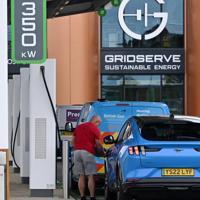BRUSSELS
Sales of electric cars slid last year in Europe in an otherwise stable market, data from carmakers showed on Jan. 21.
A total of 1.99 million battery electric vehicles were sold in Europe last year, a drop of 1.3 percent from 2023, according to the European Automobile Manufacturers Association (ACEA).
The figures represent a stall after several years of strong growth for electric vehicles (EVs) in Europe, and raise questions about the transition away from internal combustion engine (ICE) vehicles.
According to data published last week by the Rho Motion consultancy, EV sales rose 25 percent globally last year thanks to a surge in China.
According to ACEA data, overall car sales edged 0.9 percent higher in Europe, including Britain, Iceland, Norway and Switzerland, to just shy of 13 million.
“Battery-electric cars remained the third-most-popular choice for buyers in 2024,” the ACEA said.
Cars with petrol engines accounted for one in three new cars sold last year, followed closely by simple hybrids with 30.9 percent market share. Plug-in hybrids accounted for another 7.1 percent of sales.
Fully battery-electric vehicles accounted for 13.6 percent of total sales in 2024, a drop from 14.6 percent market share in 2023.
EV sales plunged by 27.4 percent in Germany last year as government incentives ended at the end of 2023.
But they jumped by 21.4 percent in Britain last year to make it Europe’s top EV market by volume, with just under 382,000 sold last year.
Norway continued to have the highest EV market share, accounting for nearly nine out of 10 new vehicles sold last year.


